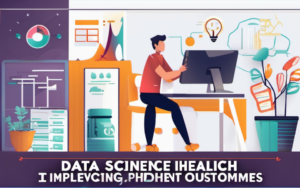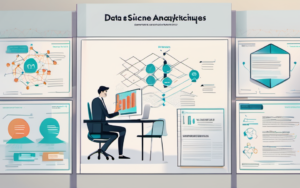Data science is a rapidly growing field that offers exciting career opportunities for individuals with the right skills and knowledge. Whether you’re a recent graduate or looking to make a career change, understanding how to break into this dynamic industry is crucial. This guide will provide you with a comprehensive roadmap to embark on your data science journey, covering everything from the basics of data science to essential skills, career paths, and continuous learning opportunities.
Getting Started in Data Science
What is Data Science?
Data science is the process of extracting knowledge and insights from data. It involves collecting, cleaning, analyzing, and interpreting data to solve real-world problems. Data scientists use a variety of tools and techniques to extract meaningful patterns and make data-driven decisions.
Why is Data Science in Demand?
The increasing volume of data generated by businesses and organizations has led to a surge in demand for skilled data scientists. Data science is used across diverse industries, including healthcare, finance, marketing, and technology, to optimize operations, improve customer experiences, and drive innovation.
Essential Skills for Data Scientists
Data scientists possess a unique blend of technical and soft skills. Here are some of the most important skills:
- Programming Skills: Proficiency in programming languages such as Python and R is essential for data manipulation, analysis, and modeling.
- Statistical Knowledge: A strong foundation in statistics is crucial for understanding data distributions, hypothesis testing, and making informed inferences.
- Machine Learning: Data scientists need to be familiar with machine learning algorithms to build predictive models, identify patterns, and automate tasks.
- Data Visualization: Effective data visualization skills are essential for communicating complex data insights to stakeholders.
- Communication Skills: Data scientists need to be able to clearly and concisely communicate their findings to technical and non-technical audiences.
Building Your Data Science Foundation
Education and Training
Formal Education Options
A bachelor’s or master’s degree in computer science, statistics, mathematics, or related fields can provide a strong foundation in data science. Many universities offer specialized programs in data science, machine learning, or artificial intelligence.
Online Courses and Certifications
Numerous online platforms like Coursera, edX, and Udacity offer comprehensive data science courses and certifications. These platforms provide flexible learning options and cover a wide range of topics, from the fundamentals of programming to advanced machine learning techniques.
Developing Technical Skills
Programming Languages (Python, R)
Python and R are the most popular programming languages for data science. Python is known for its versatility and extensive libraries for data analysis and machine learning. R is widely used for statistical computing and data visualization.
Statistics and Machine Learning
Gain a solid understanding of statistical concepts such as probability, hypothesis testing, regression analysis, and classification. Explore common machine learning algorithms like linear regression, decision trees, and neural networks.
Data Visualization and Communication
Learn how to create compelling data visualizations using tools like Tableau, Power BI, or Python libraries like matplotlib and seaborn. Practice communicating your findings effectively through presentations, reports, and data storytelling techniques.
Building a Portfolio
Personal Projects
Working on personal data science projects is a great way to apply your knowledge and build a portfolio. Choose projects that align with your interests and demonstrate your skills. For example, you could build a movie recommendation engine using machine learning or analyze trends in social media data.
Kaggle Competitions
Kaggle is a platform for data science competitions where you can test your skills against others. Participating in Kaggle competitions can help you gain practical experience, learn from others, and build your reputation.
Finding Your First Data Science Job
Networking and Building Connections
Attend industry events, conferences, and meetups to connect with professionals in the data science field. Use platforms like LinkedIn to network with potential employers and learn about job openings.
Tailoring Your Resume and Cover Letter
Customize your resume and cover letter to highlight your relevant skills and experience. Include specific examples of projects you’ve worked on and the impact you’ve made. Tailor your applications to the specific requirements of each job opening.
Preparing for Interviews
Technical Questions
Expect technical questions related to your coding skills, statistical knowledge, and machine learning experience. Prepare to discuss your projects, explain algorithms, and solve coding challenges.
Behavioral Questions
Be prepared to answer behavioral questions that assess your soft skills, problem-solving abilities, and communication skills. Think about examples from your past experience that demonstrate your strengths.
Continual Learning and Growth
Staying Updated with Industry Trends
Data science is a rapidly evolving field. Stay current with the latest trends, technologies, and advancements by reading industry publications, attending webinars, and following influential data scientists on social media.
Contributing to Open Source Projects
Contributing to open source projects is a great way to learn from others, improve your coding skills, and showcase your expertise. Find projects that align with your interests and make contributions by fixing bugs, adding features, or writing documentation.
Attending Conferences and Meetups
Attend data science conferences and meetups to stay connected with the community, learn from experts, and explore new opportunities. These events provide valuable networking opportunities and offer insights into industry trends and best practices.
Key Takeaways
A career in data science offers a rewarding path for individuals with a passion for data and problem-solving. By building a solid foundation in programming, statistics, machine learning, and data visualization, you can position yourself for success. Focus on developing your skills, building a strong portfolio, and continuously learning to stay ahead in this dynamic field.
Resources for Further Exploration
- DataCamp: https://www.datacamp.com/
- Kaggle: https://www.kaggle.com/
- Towards Data Science: https://towardsdatascience.com/
- Machine Learning Mastery: https://machinelearningmastery.com/
By taking the right steps and staying committed to continuous learning, you can unlock the exciting opportunities that a career in data science has to offer.




